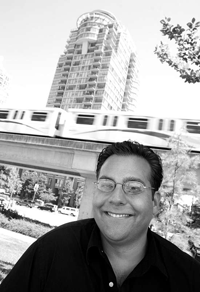
- Differences That Matter
- ILR Press (2006)
- Bookstore Finder
We like to pay lip service to our healthcare and social programs, without really knowing much about them. They distinguish us from our American cousins, and give us something to argue about.
But how much difference do those programs actually make in our lives? Middle-class American life looks a lot like ours. Our right wing tends to scorn our social safety net and the long wait times for medical care. Our left tends to defend them -- but in emotional and nationalist terms, not in the bottom-line terms that the right understands.
Now Dan Zuberi, a UBC sociology professor, has made a meticulous comparison of social policies in two similar cities -- Vancouver and Seattle. He's published his findings as Differences That Matter: Social Policy and the Working Poor in the United States and Canada. Those findings are astonishing: for the working poor, and for others, Vancouver is a far, far better place than its sister city.
Zuberi chose the cities because they're very similar in size, and they share a region. The hospitality industry is typical of the new service economy that's replaced manufacturing in the past 30 or 40 years. So he studied workers in four hotels run by the same two multi-national corporations in both countries. One hotel in each city has unionized workers; one does not.
Similar cities, different conditions
By interviewing management and staff in the four hotels, Zuberi learned a great deal about working and living conditions for the people who change the sheets and wipe the hairs off the toilets. If you think those conditions are pretty much the same everywhere in the global economy, you're wrong.
Unionization was surprisingly different. While union memberships in Canada and the U.S. were roughly the same in the 1970s, membership has fallen sharply in the U.S. while holding its own here in Canada. Zuberi traces that to Reagan's destruction of the air traffic controllers in the early '80s. American unions never recovered. Canadian unions, however, continued to flourish.
So relatively few hotel workers in Seattle work under collective agreements. The union there has to hammer out individual contracts with each hotel, in a long and awkward process. In Vancouver, most hotels operate under a single collective agreement. Choosing to unionize is much easier here.
This doesn't mean non-union hotel workers earn less. Zuberi found that non-union hotels must match union pay scales just to stay competitive. But unionized hotels hold on to their workers, while the non-unionized endure rapid employee turnover.
Vancouver hotels therefore have more experienced and professional employees, needing little training and inspection. Whether their workers are locals or recent immigrants, they settle in quickly and are rarely off the job. In the winter they can take their legally mandated paid vacation time instead of being laid off. If they do lose their jobs, they can get training while out of work. They like the neighbourhoods they live in, which have little crime, good access to transit, and plenty of amenities like parks and community centres.
A host of problems
In Seattle, by contrast, hotel workers struggle with a host of problems. Public transit isn't as good, so they have to cluster in high-crime neighbourhoods that at least have some kind of bus service to their downtown workplaces. In the slow winter season they scramble for alternative jobs, or borrow from relatives. Seattle has far fewer community resources to help workers to ride out a spell of unemployment.
Health care is critical. Zuberi's Vancouver interviewees reported plenty of ailments, but routinely saw their doctors without worrying about financial consequences—even when they were laid off.
In Seattle, hotels offer health insurance plans once workers complete their probationary period. With so much turnover, many workers never get the insurance. Those who do may still face disaster: one worker kept changing credit cards to cover $2,500 in monthly medical payments on a $2,600 monthly wage. Few workers see their doctors until they absolutely have to, which may be too late for timely intervention.
In Vancouver, 100 per cent of the workers' children had regular doctors; in Seattle, only 56 per cent did. Workers' compensation scarcely exists in Seattle, while it saves injured Vancouver workers from disaster.
So life for the working poor in Seattle is strikingly harder and more stressful than for their neighbours here in Vancouver. It's not because folks in Seattle are lazier or dumber than folks in Vancouver. It's because laws have created wildly different environments in the two cities and the two nations.
Taken for granted?
Zuberi's well-written book offers plenty of food for thought. As one who rarely travels to the U.S., I take Vancouver for granted. Of course we've got parks and community centres and medicare. Of course our schools are good on both sides of town. Of course you go to your doctor, or a walk-in clinic, as soon as you feel bad. Doesn't everyone in the industrial world?
Evidently not. And having read Zuberi's account, I feel unexpected gratitude to our politicians. The NDP made unionization easy. Bill Bennett's Socreds equalized school funding. If Campbell's Liberals have made life tougher for the working poor, at least they haven't dragged us down to Seattle's level.
Differences That Matter deserves careful reading by everyone in the province. Business managers will realize how costly it would be to follow the American model. Young people will be grateful that their entry-level jobs aren't as crappy as those in the U.S. Even those who damn and blast government on general principles will see that political decisions really do make a difference, and a big one.
Zuberi teaches us that we've made a lot of good decisions. This is no time to start making bad ones just because the Americans have. ![]()




